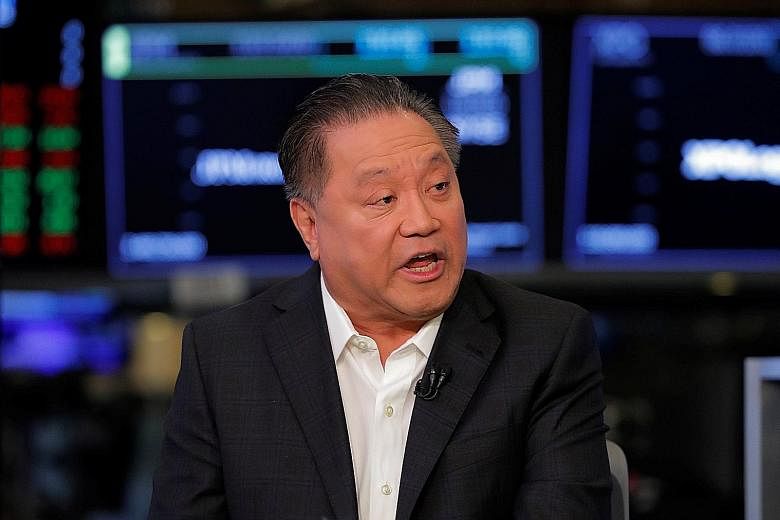SAN FRANCISCO • Broadcom's US$117 billion (S$154 billion) bid for rival computer chipmaker Qualcomm is being investigated by a federal government committee concerned about giving foreign countries power over US technology vital to national security.
But some people in the technology industry believe Broadcom chief executive Tan Hock Eng already wields too much power of a different kind, as illustrated by a harshly worded two-page document in a San Francisco court file.
The document comes from Western Digital, the largest supplier of computer disk drives. Last year, it wrote to technology partner Toshiba to complain about Broadcom, saying Broadcom had stopped shipping essential chips called preamplifiers to Western Digital. The reason? Broadcom, the document said, was retaliating because Western Digital had considered another supplier's products.
"Western Digital believes that Broadcom's business tactics have destroyed a once positive business relationship" and "raise serious antitrust concerns," the drive maker wrote. At the time, Western Digital was trying to persuade Toshiba to reject Broadcom as a potential buyer of Toshiba's stake in a memory chip joint venture with Western Digital's SanDisk unit.
The previously unreported document provides a rare account of a customer's private dealings with Broadcom.
Competing chipmakers say the firm has repeatedly used the threat of higher prices or other pressure tactics to deter customers from turning to alternative suppliers.
Such accusations help explain why the Federal Trade Commission (FTC) started probing Broadcom's business practices, which was disclosed in January. They add to the reasons that Mr Tan's hostile bid for Qualcomm - which would be the costliest technology acquisition - has consumed Silicon Valley and firms on three continents.
The fate of Broadcom's bid for Qualcomm was expected to be settled on Tuesday in San Diego. There, shareholders at Qualcomm's annual meeting were to choose between its incumbent directors and six Broadcom nominees expected to back the deal.
But the Committee on Foreign Investment in the US on Sunday ordered Qualcomm to delay the meeting by 30 days. On Monday, it sent a letter to Qualcomm and Broadcom saying it would investigate the deal for national security reasons. Broadcom is based in Singapore, though it has announced plans to move its headquarters to the US.
On Wednesday, Broadcom pledged to keep the US at the forefront of emerging mobile technology if it were to acquire Qualcomm, saying it would increase Qualcomm's research and development spending and create a US$1.5 billion fund to train US engineers.
Before the committee's unusual move, antitrust authorities were the ones who paid the closest attention to the chipmakers - mainly Qualcomm. Qualcomm is the biggest supplier of chips for smartphones but gets much of its profit from patent royalties. Its practices have prompted antitrust probes in the US, Europe and Asia and a lawsuit by Apple, a longtime customer, challenging the royalty payments. Qualcomm denies wrongdoing.
Broadcom has built its market muscle by acquiring dominant lines of chips, a mainstay of smartphones, data storage gear, set-top boxes and networking hardware. Customers include Apple, Samsung Electronics, Hewlett Packard Enterprise, Dell, AT&T and Cisco.
Buying Qualcomm would sharply expand Broadcom's position in smartphones, adding technology that manages cellular communications and runs apps. For that and other reasons, Qualcomm has predicted long and risky antitrust reviews of the deal in several countries, though Broadcom has said it could navigate the process swiftly.
The FTC review adds another facet to the aggressive image of Mr Tan, a Malaysian-born executive who has pleased Wall Street but alarmed workers by cutting jobs and long-term research after acquisitions. "He's as tough as nails," says a Silicon Valley veteran.
A CNBC article last week said Broadcom had used price increases and other threats to press for exclusive sales deals from customers such as Amazon, which was also hit by a Broadcom patent suit that was later settled. Other Broadcom customers said the chipmaker had been fair.
"Broadcom is a pretty good partner for us," said Mr Bruce McClelland, CEO of Arris International, which makes set-top boxes using Broadcom chips.
In an interview in December, Mr Tan scoffed at the notion of raising prices or otherwise exploiting customer reliance on key Broadcom chips.
"That's not sustainable," he said. "If you do that, customers never come back to you."
NYTIMES

